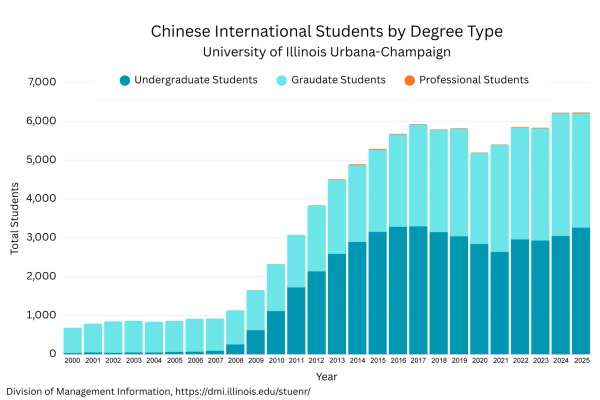Web offers book discounts

(From right) Hilary Sterk, freshman in ALS, Dallas Aramburu, freshman in LAS, and Colleen Henehan, freshman in LAS, return books at the Illini Union Bookstore Wednesday afternoon. Campus bookstores will be buying back textbooks through finals week. Patrick Traylor
May 4, 2006
Last updated on May 12, 2016 at 03:08 a.m.
Editor’s Note: This is the third in a three-part series about the rising cost of textbooks. Part one ran Tuesday and focused on the economics of making and packaging textbooks. Part two ran Wednesday and focused on the impact the increasing prices have on students.
College students and their parents are not the only people who have noticed that college textbook prices have been skyrocketing over the last two decades.
With the price of textbooks increasing 186 percent between December 1986 and December 2004, according to the Government Accountability Office, almost triple the rate of inflation during that period, state legislators and officials across the country have started taking notice. The issue has arisen in Virginia, Maryland and California, among other states.
In Illinois, Lt. Gov. Pat Quinn has been leading the call for legislation that would control the textbook prices.
Get The Daily Illini in your inbox!
“Students and parents are already shouldering the cost of tuition,” said Quinn in a March press release. “We don’t want the ever-increasing price of textbooks to put a complete education out of reach.”
The lieutenant governor is a long-time consumer advocate, said Peter Newell, Quinn’s policy director. Quinn also has two children in college and noticed the increase in prices during their college careers, Newell said.
“He saw firsthand how inflated some of these prices were,” he said.
In August 2005, Quinn announced a “College Textbook Initiative,” which calls for college bookstores to sell unbundled versions of any textbook that comes packaged with supplemental materials, and asks the bookstores to provide students with a list of required textbooks as soon as the information is available.
Quinn has also set up a Web site, www.saveontextbooks.org, where parents and students can share stories about textbook prices and also make suggestions to lower costs.
State Rep. Naomi Jakobsson (D-103) introduced a bill to the Illinois General Assembly in January that would codify the recommendations of the initiative.
The bill would also require publishers to inform faculty members of the price of textbooks and all supplemental materials in writing when they are considering which books to adopt.
Faculty would be required to inform the bookstores in writing which books and materials are required for their course and which are recommended. They would also have to tell the bookstores and publishers which is the earliest edition of the book that will be allowed for the class.
Members of the Illinois Student Senate went to Springfield on Feb. 22 to lobby in support of the bill. They also sent letters to all the members of the General Assembly expressing their support.
“The Student Senate has been working very closely with Rep. Jakobsson on this issue,” said ISS Government Affairs Committee Chairman Justin Cajindos, junior in LAS. “And we’re very pleased that she has been listening to her student constituents in regards to this issue and has been advocating on their behalf.”
Erik Wiatr, legislative aide to Jakobsson, said that the bill is still in the House Rules Committee due to the shortened legislative session this year and a limit on the number of bills a representative can push in one session. It will most likely not make it to the floor of the General Assembly until next year.
“It’s still something that the representative is committed to and is going to continue pushing in the future,” Wiatr said.
With the legislative process taking as much time as it does, students are forced to turn elsewhere for relief from high prices.
Since 2002, students have been able to turn to the Illini Book Exchange Web site, www.illinibookexchange.com, to buy and sell used books and course packets without going through a campus bookstore.
The site allows students to search for books by course, instructor, book title, author or International Standard Book Number, better known as ISBN.
The Technology and Management Club operates the site, which has sold $563,350 worth of books and made 14,128 trades since Dec. 2, 2002. Illini Book Exchange currently has over 8000 active users and almost 10,000 books are available on the site.
Another option for students on the Internet is a Web site called www.swapsimple.com. The site allows students to trade textbooks for other textbooks or even DVDs and videogames. The site charges $2 per trade regardless of the number of items.
“The whole concept was ‘how can we get students to get what they need without having to spend any more money?'” said Swap Simple President and Chicago resident Elliot Hirsch, 28.
Students can sign up for the site, which has no advertising, for free. Once they are logged on students can enter the books they want to trade by ISBN. They are then allotted a certain number of trade credits based on the current market value of the book. These credits can then be used to buy items that have been posted on the site.
Pre-addressed, pre-paid mailing labels can be printed off the site in order to ship items that are being traded.
Hirsch said the entire system is automated and the fee goes to pay employees so that customers can take their problems to a person rather than a computer.
“We didn’t want students to have to waste time bartering back and forth, ” he said.
The site began in 2005 solely for trading textbooks and the DVDs and videogames were added at the beginning of this year based on customer feedback.
Co-founder Eric Haszlakiewicz, who developed all of the computer systems for the site, is a University alumnus.
In order to help students who cannot afford to buy all of their books, the Illini Union Bookstore and the University Library have teamed up to start a pilot program that makes a few copies of certain books available to students on reserve in the library.
The books are chosen based on recommendations made by the library, and the bookstore places a tag on the shelves near those titles informing students that the books are available on reserve in the Undergraduate Library. There were over 600 titles on reserve this semester.
Officials from the bookstore and the library will meet at the end of this semester to evaluate how the program is working and to plan for the future.
Students will continue to turn to the Internet and the library reserves for relief from the ever-increasing price of college textbooks, while they wait almost a year before Jakobsson’s bill is debated on the floor of the General Assembly,
“I think this issue has been overshadowed by sexier higher (education) issues,” Cajindos said, citing decreased state funding and deferred maintenance as examples.





